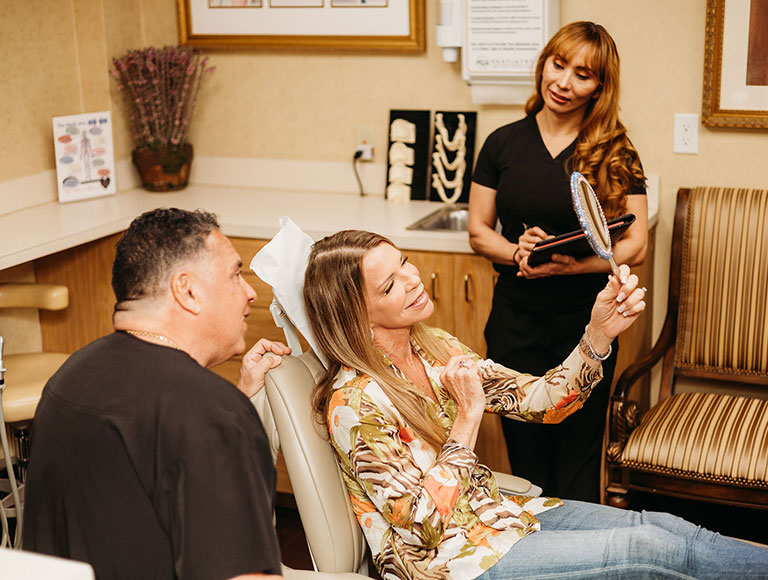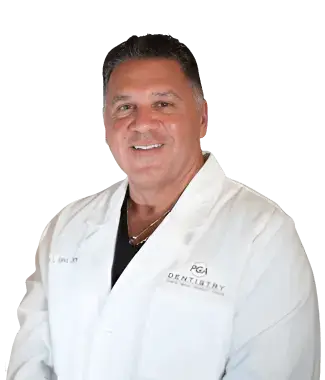Maintaining Your Dental Implants: A Guide from PGA Dentistry

Dental implants are a transformative solution for those seeking a permanent and natural-looking replacement for missing teeth. At PGA Dentistry, we want our patients to understand the importance of maintaining the longevity of their dental implants. Proper care is essential to ensure they remain functional and aesthetically pleasing for many years.
To learn more about dental implants in Palm Beach Gardens, contact our dentist at (561) 627-8666 for your complimentary consultation.
Caring for Your Dental Implants
While dental implants are a durable and effective solution for tooth loss, they require diligent care to ensure their longevity. Proper maintenance not only preserves the implants but also prevents complications such as peri-implantitis, a condition similar to gum disease that can lead to implant failure.
Caring for your dental implants involves more than just daily brushing. It’s about adopting a comprehensive oral hygiene routine, making informed lifestyle choices, and attending regular dental checkups. With the right care, dental implants can last a lifetime.
-
Basic Oral Hygiene Habits
Good oral hygiene is essential for maintaining the health and longevity of your dental implants. Oral hygiene habits to follow include brushing your teeth twice a day, flossing daily, and using an antiseptic mouthwash to kill bacteria and freshen your breath.
-
Brushing Your Teeth
One of the most effective ways to maintain dental implants is by brushing your teeth twice a day.
Use a Soft-Bristled Toothbrush: Soft bristles are gentle on the gums and implant surfaces, reducing the risk of gum recession and damage to the implant.
Brush Gently: Avoid applying too much pressure. Use a gentle, circular motion to clean all sides of the implant and the surrounding gum tissue.
Consider an Electric Toothbrush: Electric toothbrushes can provide a more thorough cleaning, especially around the implant areas. -
Flossing
Flossing is crucial for removing plaque and food particles from between your teeth and around your dental implants.
Use Implant-Specific Floss: There are flosses designed specifically for use with dental implants. These are usually softer and more effective at cleaning around the implant without causing damage.
Floss Daily: Make flossing a part of your daily routine to prevent plaque buildup that could lead to gum disease and peri-implantitis.One of the best methods for flossing is known as a Waterpik. It can reach difficult spots and keep the gum line clean.
-
Using Antibacterial Mouthwash
Rinsing with an antibacterial mouthwash can help reduce the risk of infection and inflammation around the implants.
Choose Alcohol-Free Mouthwash: Alcohol-based mouthwashes can dry out the mouth, leading to irritation. Opt for alcohol-free options that are gentle on your oral tissues.
Rinse Twice a Day: Use mouthwash in the morning and before bed to keep your mouth bacteria-free. -
Routine Visits to the Dentist
Even with a diligent home care routine, professional teeth cleanings are necessary to remove hardened plaque (tartar) that can’t be removed by brushing and flossing alone. Our dentist will use specialized tools to clean around the implants without damaging them. During your checkups, our dentist will also assess the health of your implants and the surrounding gum tissue. This includes checking for signs of peri-implantitis, bone loss, and other potential issues.
Problems That Can Occur Without Dental Implant Maintenance
Implant maintenance problems can occur despite regular care and maintenance. Here are some common problems and how to address them:
Peri-implantitis: This is a type of gum disease that affects the tissue around the implant, leading to inflammation and bone loss. Symptoms include bleeding, swelling, and redness around the implant. To treat peri-implantitis, your dentist may recommend antibiotics, deep cleaning procedures, or even surgery in severe cases.
Loose implant: If you feel like your implant is loose or wobbly, it may be due to a loose abutment screw or implant failure. Contact our dentist immediately for an evaluation and treatment options.
Broken restoration: The crown, bridge, or denture that’s attached to the implant may become loose, crack, or break over time. This can be due to normal wear and tear or physical trauma. Depending on the extent of the damage, your dentist may recommend a repair or replacement.
Gum recession: Gum recession can occur around the implant, exposing the implant to bacteria and leading to implant failure. Our dentist may recommend gum grafting surgery to address the recession and prevent further damage.
If you’re dealing with any problems after your dental implant procedure or anything mentioned above, contact our dentist in Palm Beach Gardens by calling (561) 627-8666.
Frequently Asked Questions
-
How often should I visit the dentist after getting dental implants?
Patients should visit their Palm Beach Gardens dentist every six months after getting dental implants to ensure their longevity and monitor the surrounding oral health. These checkups involve professional cleanings to remove plaque buildup and X-rays to confirm the implant’s stability, preventing issues like peri-implantitis. Regular visits allow early detection of potential problems, such as gum inflammation or crown wear, keeping your smile healthy and functional.
-
Can I continue to use my regular toothbrush and toothpaste on my dental implants?
You can use a regular toothbrush and toothpaste, but choosing implant-specific options enhances care. To clean the implant crown and post without scratching or irritating gums, opt for a soft-bristled toothbrush like the G.U.M. Technique Deep Clean and a low-abrasive toothpaste like Sensodyne Pronamel Gentle Whitening (RDA ~34). Avoid medium or hard bristles and high-RDA toothpastes (above 100), as they may damage the restoration or surrounding tissue over time.
-
Can I brush my implants like natural teeth?
Yes, but use gentle circular motions and a soft-bristled toothbrush. Electric toothbrushes with pressure sensors are particularly effective, removing up to 10 times more plaque than manual brushes while minimizing irritation. Brush twice daily, focusing on the gumline where the implant meets the tissue, to prevent bacterial buildup. Flossing or using interdental brushes daily further ensures thorough cleaning.
-
Can plaque grow on implants?
Plaque, a sticky bacterial film, can accumulate on dental implants just as it does on natural teeth, potentially leading to peri-implantitis, a condition causing gum inflammation and bone loss around the implant. Without proper oral hygiene, plaque buildup can compromise implant stability, with studies showing up to 15% of implants may develop peri-implantitis within 10 years. Regular dental cleanings and at-home oral healthcare can help prevent plaque buildup, gum disease, cavities in surrounding teeth, and bone loss.
-
What's the best toothpaste for a dental implant?
It’s generally recommended to use toothpaste that’s low in abrasive particles, as these can scratch the surface of the implant’s porcelain or ceramic crown. Look for toothpaste that has a low RDA (Relative Dentin Abrasivity) value, ideally under 70. Avoid high-RDA whitening toothpastes. The dental crown, bridge, or denture is resistant to staining and cannot be whitened, while the abrasion can wear down restorations over time.
Some toothpaste brands also offer specialized formulations for people with dental implants, which may include ingredients such as antibacterial agents to prevent plaque buildup or enzymes to break down bacteria.
-
Do I need to avoid any specific foods after getting dental implants?
For the first four to eight weeks after implant surgery, avoid hard, sticky, or crunchy foods like popcorn, toffee, or raw apples to prevent stress on the healing implant site and promote proper bone integration. After recovery, limit sugary snacks (e.g., gummies) and acidic beverages (e.g., cola, orange juice) to reduce plaque and protect gum health, minimizing the risk of peri-implantitis.
Opt for soft, nutrient-dense foods like smoothies, scrambled eggs, or steamed vegetables during healing. A balanced diet and diligent oral hygiene ensure implants remain durable and natural-looking, as advised by specialists in cosmetic dentistry.
Your Dental Implants Can Last a Lifetime at PGA Dentistry
With proper care, dental implants are a life-long solution to missing teeth. If you have any questions about dental implant care, contact our Palm Beach Gardens dentist today by calling (561) 627-8666. We’re more than happy to answer any questions you may have.

Complimentary Consultation
or 2nd Opinion
- Exam
- Full mouth X-rays
- Private Consultation with Doctor ($450value)
- 7100 Fairway Dr Ste 59,
Palm Beach Gardens, FL 33418 - (561) 627-8666
- Monday: 8am - 5pm
- Tuesday: 8am - 5pm
- Wednesday: 8am - 5pm
- Thursday: 8am - 5pm
- Friday: 8am - 1pm
- Saturday & Sunday: Closed